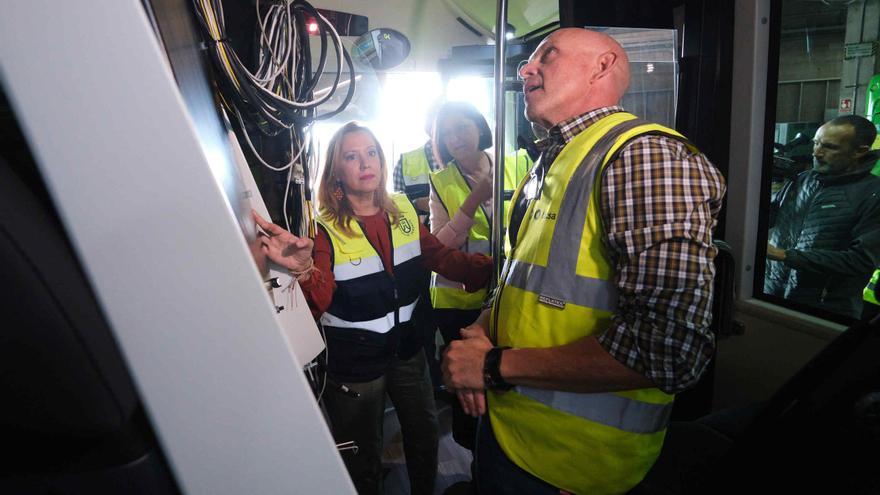
Surveillance cameras, ticket cancellation system, payment devices, mechanisms for real-time location tracking… The new vehicles of the Titsa company are equipped with the most cutting-edge technology in their sector. «Inside each coach, we have installed all the computer and communication systems equivalent to those that can exist in any office», described Julio Ríos, the Director of New Technologies at the transport company.
The Cabildo has purchased 250 coaches, of which 75 are already on the island and 23 are located at Titsa’s central offices and workshop, in Santa María del Mar. The island’s president, Rosa Dávila, visited there on Monday announcing that “in one or two weeks” some of these recently acquired vehicles will already be in operation. Out of the total 250, 70% are hybrid, which will allow the renewal of the current fleet of over ten years old, reduce greenhouse gas emissions by 7,253 tons, and save 30% on fossil fuel consumption.
Dávila and the Mobility councillor, Eulalia García, visited the company’s facilities with Julio Ríos and Titsa’s Technical Office manager, Pedro Gómez, greeting administrative and workshop staff until reaching the area where the new coaches are currently undergoing technological optimization.
The previous process is not simple. “The larger the vehicle, the more equipment it carries, but within about 15 to 20 days, it is ready to start operating,” Ríos pointed out, emphasizing that further bureaucratic procedures are then required for it to start providing service to users.
Cables hung next to the driver’s area in several vehicles and compartments were open housing technological devices. “Each coach onboard carries five cameras and continuously records,” detailed Pedro Gómez. “In Titsa’s control centre, where the SAE [Operation Assistance System] is located, if there is any incident inside the bus, the driver is immediately notified. 112which already activates the security forces or health means to act as quickly as possible,” he expressed concerning security.
Titsa’s Technical Office manager estimated that the company currently has 631 vehicles at its disposal. This number will fluctuate with the new additions and the withdrawal of the older coaches.
Gómez praised the capabilities of these hybrid coaches, highlighting that their gearbox can be programmed to adapt to the terrain. He admitted that there are specific routes, such as the ascent from San Andrés to Taganana, for which they are not suitable.
Rosa Dávila celebrated the passenger numbers during the first quarter of 2024 in statements to the media. “Titsa transported 19.9 million passengers, compared to 16 million last year, representing a growth of 24.6%. That is, there are around 4 million more compared to the first quarter of 2024,” she analysed. In her view, these figures “confirm the importance of maintaining the public transport’s free use, which proves to be a decisive factor in encouraging the use of coaches over private vehicles.”
The island institution also highlighted that the arrival of these 250 coaches represents «the biggest commitment to public transport in the history of the Cabildo, with an investment of 88.48 million Euros». The press release issued after the event stated that the objective is to “enhance the sustainable mobility of users by implementing new lines and strengthening the most congested routes in the North and South.”
Accessibility
Another aspect emphasized by the Cabildo is that all acquired coaches meet “accessibility requirements, allowing Titsa to position itself as the third largest public transport company with Spain’s most modern and sustainable fleet,” as stated in the press release.
They also mentioned that all vehicles will be adapted for people with disabilities, representing “a substantial improvement, as currently only 60% of the coaches in service are adapted.” In more detail, the vehicles come with a four-year warranty, and seven years for the hybrid batteries. “The reinforcement of the new coaches is part of a series of actions implemented in recent months, such as the hiring of 67 new drivers, of whom 25 have already completed their training,” added the Cabildo.















